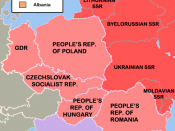People living in Czechoslovakia during the 1960's experienced many problems that affected their lives in various ways. For example, in 1962-63 poor planning on the part of the Soviet Union caused living standards, food, and supplies to decline. Although reforms were put in place such as decentralization of the economic system, these reforms only enticed the Czechoslovaks to want more reforms. By the late 1960's, there were open challenges to the one-party state, which was solely controlled by the communist party. Alexander DubÃÂek, leader of the Slovak section of the Communist Party, reassured the Soviet leaders that Czechoslovakia would remain faithful to the Communist principles, however, he continued to implement additional reforms which included letting farmers choose what crops to grow, allowing the press to disobey censorship regulations, and permitting pressure groups and organizations to form. This period of political and cultural activities flourished and became known as 'Prague Spring' (pg.413-414).
The best way to gain an understanding of the atmosphere that existed just before and after the 'Prague Spring' uprising of 1968, one only has to observe the complex relationships that Milan Kundera explores in his novel The Unbearable Lightness of Being. In his novel, Milan Kundera uses these personal relationships to indicate what life was like under the Communist dominated Soviet Bloc. With this said, in this essay, I will discuss what I believe is the symbolism behind the main characters and how the notion of communism is portrayed through them.
One of the relationships that Kundera explored was the one between Tomaà ¡ and Tereza. These two characters symbolized communism in differing ways according to their insecurities and needs. For example, because Tomaà ¡ was a smooth talking, debonair man, he was able to have short-term sexual relationships with nearly two hundred women, only one of which became a...


